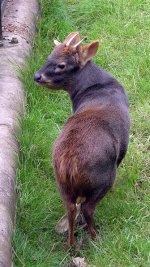 The pudu (Pudu puda) is the smallest deer in the world, ranging from 60 to 85 centimeters in length. They can be found in Chile and Argentina from sea level to 3200 meters high. They are very cautious animals, checking the wind every now and then by standing on their hind legs when feeding on twigs and bark, fruits, leaves and seeds. Its predators are eagle owls, the cougar, foxes and small cats. When the pudu feels threatened, it flees usually in a zig-zag pattern and have the unique ability, for deers, to be able to climb trees when threatened. It is listed as endangered by the IUCN and its main threats are habitat destruction, roe and fallow deer introduced from Europe, and domestic dogs.
The pudu (Pudu puda) is the smallest deer in the world, ranging from 60 to 85 centimeters in length. They can be found in Chile and Argentina from sea level to 3200 meters high. They are very cautious animals, checking the wind every now and then by standing on their hind legs when feeding on twigs and bark, fruits, leaves and seeds. Its predators are eagle owls, the cougar, foxes and small cats. When the pudu feels threatened, it flees usually in a zig-zag pattern and have the unique ability, for deers, to be able to climb trees when threatened. It is listed as endangered by the IUCN and its main threats are habitat destruction, roe and fallow deer introduced from Europe, and domestic dogs.
The Chilean pudu, southern pudu is listed as Vulnerable (VU), considered to be facing a high risk of extinction in the wild, on the IUCN Red List of Threatened Species
Southern pudu habitats
Subantarctic forestSome facts about the
Southern pudu
Adult weight : 10 kg (22 lbs)
Maximum longevity : 18 years
Female maturity :274 days
Male maturity : 320 days
Gestation : 200 days
Weaning : 61 days
Litter size : 1
Weight at birth : 0.9 kg (1.98 lbs)

Custom Search